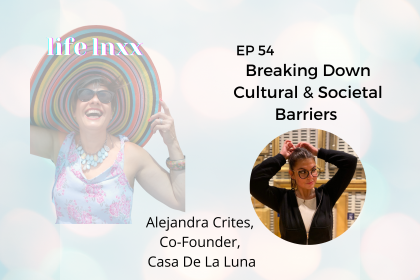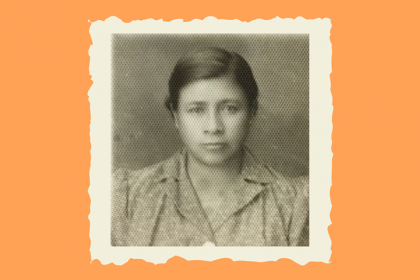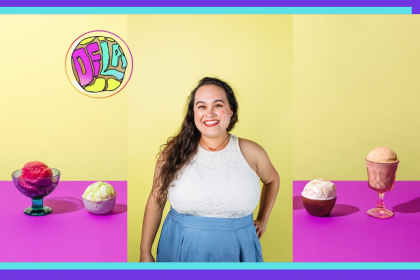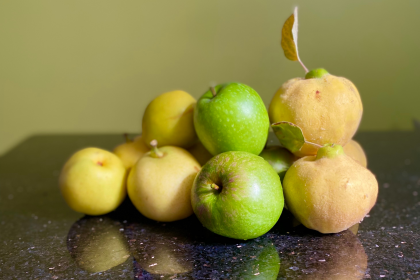{Music begins with Intro}
HOLA CHICAS!
I am Consuelo Crosby – born with both sides of my brain fighting for attention.. structural engineer & creative, mother & mentor, center of any spontaneous fiesta if I’ve had my morning latte… I give it all to being a 1st generation Peruvian badass chica!
So grateful you’re here today, wanting to shed that armor, relax into your truth, your value… pick up your salsa step, tune out what’s getting to you and be lifted from goddesses in generations past that taught us to live life large and out loud… cuz we’re not blending in…
LIFE LNXX… knowledge you didn’t even know you had TO BE THE BADASS CHICA YOU WERE BORN TO BE!
{Episode 1}
Hola chicas!
I feel really fortunate to finally be coming across the sound waves at a time when we have had over a year to pause and reflect, after we got over the original smash into the brick wall, about where we are in our lives.
And how did we get here? And do we want to go back to where we left off? It’s sounding, pretty much for a majority of the population that would be a no, negatory. And we’re reevaluating, how do we want to pick up from here? So, how did we get here? Did we need a pandemic to have us stop and reevaluate?
Wait, did I get on this ride some 20 years ago and forgot to get off? Or, I wasn’t paying attention and so I stayed on. You know, like that Ferris wheel when you think, okay, I’ve had enough and I want to get off, but , oh, it’s going to take bucket by bucket. I have to go three quarters of the way around this circle before I can get off.
And then maybe by the time, it’s your turn? Like, Hey, no. Okay. I’m going to go another round.
So I really value that we’re talking about this today, not so much the economy or the pandemic, but rather our identity. And if we find ourselves off track from where we want to be or where we thought we’d be. How did that all come about? This disruption in your identity, I really feel, was probably created during your childhood because being different was always excrutiatingly magnified and ridiculed probably by the masses who had already established how things were going to be.
Whether you were at school or in sports or in any kind of extracurricular, there was a sense that you being different was not a good thing. I am sure you remember a traumatic moment that left you wishing you were someone else or a lesser version of who you were born to be. It could have been something as unique as your intelligence, your skin color, your name that came from a loving culture beyond these borders.
Something or someone made you pivot away from yourself and attempt to blend in. And that blending in, that need to be a lesser version of yourself, got you to a different place than you thought you’d be at this point. But what if that someone, that someone who made you pivot away from yourself, was your own family? The very DNA that you’re supposed to be a direct descendant of yet makes you feel like you don’t belong.
That’s where we start today, realizing that you come hardwired into this world, but the wiring may not be directly connected to your parents or your siblings, but instead to some other amazing person in your family’s past that, if you’re lucky you have the chance to meet and talk with. The special connection who knows exactly what it feels like to be you and how awesome you are.
They would tell you, “I love your”… fill in the blank here. For me, it would have been, “I love your sassiness. I have that same sassiness. We are fabulous because of it”. I call this person, your Life Link.
I fall into this group where my mother, the only female in my family, had a personality far from my own. I definitely have a lot in common with her and I dearly loved her. And so many of my features are a direct derivative of my mamacita’s DNA.
She is from Arequipa in Southern Per, a beautiful high verdant desert plain surrounded by three volcanoes whose melting glaciers run down to the city, making everything green around it. It only rains eight, maybe 10 inches a year there. The sun is always shining and the white buildings made from the volcanic ash, glisten as a backdrop to this bounding bougainvillea growing out over the black wrought iron gates that are on the walls. It’s stunning there.
And so was my mother. I always thought she was exotic both in appearance, with her dark caramel skin and her high cheekbones, and how she viewed the world where anything is possible, so let’s go do it, which was really an exhausting personality for me, her only advocate, because I had to keep up with her well into her eighties. She even worked until 82 running the corporation that she started.
So, you know, she was brilliant; our matriarch that created the spiritual and financial wealth in our family, and I always hoped I would look like her as I grew up. I already had the dark hair, and the caramel skin, and I can only hope that my round chubby cheeks would someday rise to be like her sharp cheekbones.
But when I was really little, and this is back in the late sixties, she began teaching me that exotic, her look, was not acceptable. That girls in America couldn’t look different than those in our neighborhood. And I remember being four years old and my mother coming to tuck me in at night. She sat on the edge of the bed one day and began pulling up on my nose with her forefinger and her thumb, just grabbing it at the base and pulling it up and up and up over and over again.
And I cried out, like, “What are you doing? Stop that hurts”. And she just looked at me, probably apologetically and said, “Pretty girls need to have upright noses”. I looked at her gorgeous face, her wider nose balancing her broad cheekbones and wondered, why can’t my nose be like yours. You’re beautiful. I want my nose to stay like yours.
It really blew my little four-year-old brain that my mamacita didn’t want me to look like her and that she didn’t consider herself pretty here. That moment began an entire childhood, all the way through college, of trying to alter my natural looks, my natural expressions, my natural tendencies of what I wanted to do because of some ulterior motive that I had yet to understand.
My mother’s motive was to protect me from the pain she experienced in living here, in her second home. She realized that being different would make life difficult for me so she tried to make me “blend in” to this perceived American Standard of what women should be like.
Yet, thankfully, she loved her birthplace, too, and inundated us in her culture at home. I totally identify with this more than the American version she was trying to have me assimilate. The food, the loving people embracing strangers, the spontaneous party that starts when a few friends gather and the open invitation to just walk into your friends house when you’re nearby. To not stop by would be considered an insult.
So when my friends asked, “Can’t we call you Connie?”, I would just utter, “Ugh. No, you can handle one more syllable.”
“Why do you eat funny food for lunch?” I’m thinking, what is not to love about stewed sheep stomach?
“Why does your mom talk funny?” Okay. This remark just got a blank stare because I didn’t know what they were talking about.
For these people, the ones that were taking shots at my base identity, identity that I was born with and born into, for these people my mother was trying to physically alter my features so that they would accept me to be one of them.
And yet, by the time I was in high school, the ulterior motive was in full swing with my mother uttering a constant mantra of, “They like upright noses. They don’t like skinned knees. They don’t like wrinkles. They don’t like sloppy clothes. They don’t like… ‘They’. ‘They’ in the seventies was not the ‘they’ of today. Unfortunately, very far from it. ‘They’ became the word for an entirely different sense of being. ‘They’ became the word for an entity of being accepted into the world outside our home.
‘They’, at that time, was the American standard, a standard that was not created by women, that was not created by the majority, but for some reason, and this is sounding very familiar to current day, I know, this small entity had created what would be the American standard for women and this is very similar to the plumbing fixture because it’s basically filled with the same stuff.
So, here I was, a new teenager, being told by my own mother that my adorable pudgy nose was ugly, my boisterous personality was off putting, my athletic abilities, which did cause some major wipeouts and to this day scarring, were unbecoming.
But, at that point, the girls in school were starving themselves on carrots and salads in order to fit into their Ditto jeans. Ditto jeans are these colored jeans that had this horseshoe looking seam that ran from the ankle of one leg up and over your butt and down the other leg. And this was the epitome of the attractive girl jeans, but there was no way my Latina body was going to fit in those.
Plus, my friends always wanted to go tan. They always wanted to go outside any sunny day, whether it was the beach or their backyard, and smother themselves in baby oil to ensure a dark brown skin tone like my mother’s. The same color they questioned as being so different.
So, I am getting a little confused here as a young person. If my mother is trying to alter my features and how I act in order to be accepted into this American standard. But this American standard is trying to change its body size and body type and color of skin. I’m thinking, wait a minute, you’re trying to get me to fit in and make me look like a typical American girl and all the while the American girls were trying to change everything about themselves.
This was a moving target. This was not going to be successful. You know what I’m talking about here. Each of us has a unique story of being told we have to change ourselves in order to fit in. Whether it’s the current look we’re trying to fit into, a position at work, the cool people group. You’re being told to change your most unique identity in order to fit into this moving target of acceptance, usually defined by a minority of people.
Still, you have to admit, she was definitely on to something about the American standard of acceptance back then, because, this standard, we are still trying to gain some power over and make changes and break this oppressive stereotype of what being a woman here looks like, acts like, dresses like.
What we really need is the voice of the person who knows what it’s like to be us, the person who came before with the DNA that is pulsing in you now, and just happens to be your go-to personality. This person, your Life Link, would understand, even encourage you to keep doing what you’re doing, to just say no to the pressures of conformity and live your true self out loud.
Think about all the chaos you could have been spared if you had only known that you are just like your great aunt or your grandfather. Someone who is just like you and comes from a place where you make sense in the world. They would be able to gift you the solace, the comfort to embrace who you are, to thrive with these God-given talents that have purpose and need, that the world is relying on you to be living fully, out loud, the way you were born to be.
Or, maybe your Life Link didn’t get to live their full self. Maybe there were laws inhibiting them from being their true selves. Laws made to oppress them for being different. And, maybe now, you can pick up the torch, where they left off, and continue this battle for your next life link to live freely and loving themselves from the start.
For me, I had yet to know of my life link and I began to wonder where I came from. I didn’t have my mother’s fear to assimilate. So my mother, in one regard, had packed me full of her Peruvian culture at home. But, as soon as I were to walk out the door, I had to become this American standard of what women were supposed to be. But with my personality, that was not going to happen because I didn’t differentiate between inside the house and outside the house. Whoever I was inside, was going to be whatever the world got.
This left me dangling in this unknown place with no mentor for negotiating, what to do when offered chipped beef on toast at your friend’s house; or, not being allowed to sleep over when that is all you do by the time you are a ten-year-old girl; or, knowing any of the pop culture TV shows, when all that’s tuned in at home are Latin novellas. It left me wondering, why am I so different than my own mother and where the heck did I come from?
So, even if you’re born here or your parents were born here, your DNA is pulsing with thousands of years of personalities that brought you to this moment. You never know which one of these is going to rise to the surface, become your dominant person and make you feel like you just don’t fit in with your family.
And if you feel like this, that there’s this unexplainable piece of you that doesn’t fit in, I think you should start asking questions about your parents and their childhoods and your grandparents. And you may begin to realize that you are very similar to your great, great someone or other, who also was rascally or quiet or studious or an adventurer, but they’re just like you.
Find that connection you need, that Life Link, to feel aligned with your identity, and thrive with understanding and appreciation of self. Mine actually comes from my great aunt, who I did get to meet in Peru when I was 15, but that is an entirely different episode. So, until next time ladies, remember you come from greatness that you can tap into and you are not alone in your identity in this world. There is someone you come from.
Now it’s up to you to to see if you can go and find your Life Link. Maybe some of you already have and I would love to hear your stories. You can reach out to us at our website, TheLnxx, that’s L N double X, dot com, and share your story with us. I’d love to hear it.
And we could talk about it later on another episode.
{Music begins with Outro}
I really appreciate the time you take to rate and review the podcast. Get the backstory on what you’ve heard here today, and reach out to us at TheLnxx.com. That’s L N double X, because it’s about time, it’’s about us. Stay in the groove on our social media at LifeLinks and get ready to make your move, ladies.
Viva!
{Music ends}





[…] adventures in this culture where everyone is booked for months ahead of today. It’s my Life Lnxx trait of loving a very social culture where people come first, whether it’s to have a good time […]